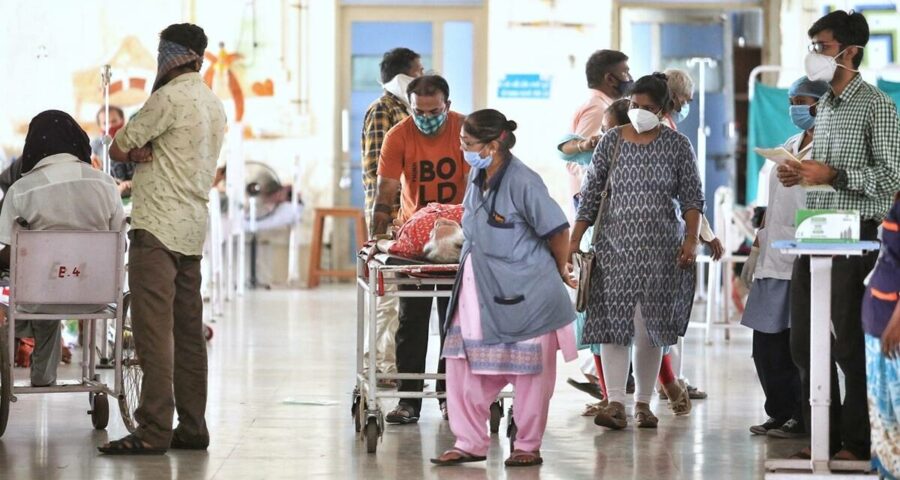Citizen awareness is key to address pandemics and antimicrobial resistance resulting from indiscriminate use of drugs
Written by Om Prakash Kansal and Jyoti Joshi
As India prepares for the third wave of the pandemic, the ghosts of fungal infections (black, white, yellow fungus) loom large in our memory. Covid-19 is testing each aspect of our life -social interactions with friends, school schedules, office routines and religious occasions because the SARS-COV2 virus modifies itself in response to our behaviour. Now more than ever the Inappropriate and indiscriminate use of steroids that contributed to the shocking outbreaks of “black fungus” and serious complications in Covid-19 patients is a grim reminder of the scourge of antimicrobial resistance.
Antimicrobial resistance (AMR) is the ability of microorganisms (such as bacteria, fungi, viruses, or protozoa) to nullify the effects of antimicrobial drugs, resulting in these drugs becoming ineffective. It is a natural process but is accelerated by a number of actions, including inappropriate prescribing, poor infection control practice, and excessive use of antimicrobials in agriculture. It manifests silently by making illnesses last longer, prolonging hospital stays, increasing mortality, and adverse outcomes for patients undergoing joint replacement, cancer care or even simple surgeries. It’s estimated to cause almost 10 million deaths and an economic loss of 100 trillion USD to the global economy by 2050. Low- and middle-income countries with a higher rate of resistance (40-60%) will bear a greater part of this burden.
Like climate change, antimicrobial resistance is a man-made planetary health problem due to misuse, abuse and overuse of antibiotics. Human health and the health of our planet are inextricably linked and flourishing natural systems and the wise stewardship of public goods like antibiotics is key for both our health and that of our planet. Even in the US, about 30 per cent of antibiotic use is in outpatient settings unnecessary and contributes to this burgeoning burden of resistance that could reverse a century of progress since the discovery of antibiotics. Moreover, antibiotic-containing discharge from hospitals, pharma manufacturing plants, poultry and cattle farms and even our homes, causes irreparable damage to the environment, pushes more people into extreme poverty, endangers global health security and jeopardize progress towards the Sustainable Development Goals.

The Centre recognised this challenge of AMR and launched the National Action Plan on Antimicrobial Resistance (NAP-AMR) in 2017. With inter-ministerial involvement, it is heartening to see the ministries of Agriculture and Farmers Welfare; AYUSH; Chemical and Fertilizers; Consumers Affairs Food and Public Distribution; Drinking Water and Sanitation; Environment Forest and Climate Change; Finance; Food Processing industries; Health and Family Welfare; Human Resource Development; Information and Broadcasting and Science and Technology working together following the joint public declaration at the launch of the NAP-AMR in 2017 to achieve the six strategic priorities outlined in the plan. Scientific solutions such as monitoring antimicrobial consumption in humans and animals, improving biosecurity in animal farms, improvising water and sanitation in health care facilities and investing in resilient health systems have been proven to be effective.
Unlike other vertical health programs like Tuberculosis or Malaria control, addressing AMR is not the purview of the Ministry of Health and Family welfare alone. Though inter-sectoral declarations and commitments were announced at the time of announcing the NAP-AMR, action on the ground needs a booster shot. So far, only three of the 28 states and 8 Union Territories (Kerala, Madhya Pradesh and Delhi) have launched their own state action plans to address the problem and hope that many more are working on it.
Enhancing awareness and understanding of the AMR in the general population and health care workforce is the cornerstone to combatting AMR. Irrational use of antibiotics in humans and animals- for viral self-limiting infections or quick profit in poultry farms, crops and fisheries, and poor waste management of sewage from hospitals and pharmaceutical manufacturing units etc. irreparably damages our ecology. Every citizen needs to be conscious and aware of their own antibiotic footprint. There is a need for easy to use, simple messaging tools to communicate to the public the magnitude of antibiotic use in humans, animals, and industry, and how behaviour change can support the reduction of overuse and misuse of antibiotics worldwide.
Schools and colleges can be key sources of reinforcing these behaviours and successful past precedents of involvement of children in campaigns for road safety should be the blueprint for these campaigns. International and national platforms workshops for sharing of best practices for making appropriate changes in behaviour that reduce their direct and indirect consumption of antibiotics are needed at all ages and school and college levels in different countries and economies.
Three and half decades ago, the extensive contribution of National Service Scheme (NSS) volunteers in the educational institutes across India for the dissemination of HIV-AIDS awareness and the dos and don’ts expanded the successful messaging on this dreaded disease in cities, towns, and villages. Now, with the digital revolution and innovative IT tools, we urgently need to develop and disseminate audience-appropriate messages on appropriate antibiotic use and the dangers of AMR. The Covid-19 pandemic has catapulted the virtual connection to a different scale and the opportunity could be leveraged to loop in millions of youths from educational institutes in the fight against AMR at a minimal cost.
The concept of prescription-only use of antimicrobials should be deeply entrenched in all consumers. Success will be achieved only when we realise that inappropriate use of antimicrobials is unethical.
Kansal is Senior Manager, Global Health, Becton Dickinson. Joshi is South Asia Center For Disease Dynamics, Economics & Policy (CDDEP) & Adjunct Professor, Amity Institute of Public Health, Amity University, Noida. The opinions expressed in this article by the authors, are theirs alone, and do not reflect the opinions of their respective organisations or any employee or affiliate thereof.
Source: Read Full Article


